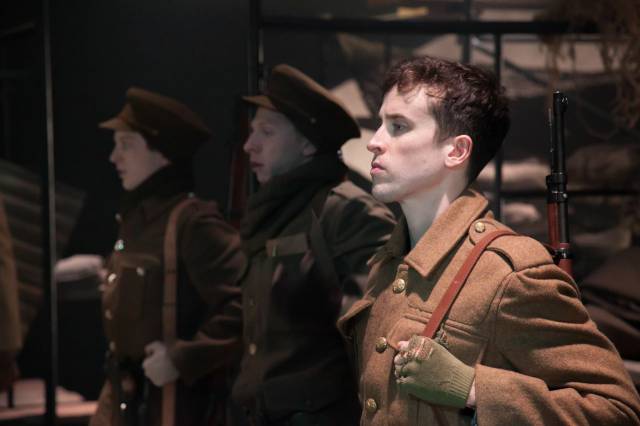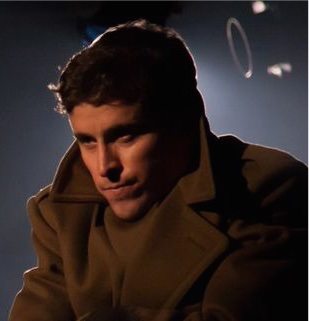

Stephen James Anthony is a New York-based actor originally from Minnesota who has recently appeared in War Horse on Broadway, The Grand Manner at Lincoln Center Theater, and Lancelot 360 Rep. He is currently playing Private Thomas Pfeiffer in New Ohio Theatre's In Fields Where They Lay, a new play by Ricardo Pérez González about the Christmas Truce of 1914. He recently sat down with StageBuddy to discuss In Fields Where They Lay, the extensive research necessary for a war-themed period piece, and the challenges of performing in a dialect.
You were on Broadway in War Horse, which took place during WWI. In Fields Where They Lay takes place during that same time period. Is this a coincidence, or do you have some fascination with that time period?
Well, I think I’m starting to be typecast as a dude from 1914. (Laughs) But it is kind of funny. When my manager approached me to audition for this, he asked if I wanted to do another World War I play. When I read the script, I thought it was just such an incredible story, and that coupled with the fact that I am a history nerd, and love delving deeper into that kind of stuff, and the company Dreamscape I had heard great things about as well, and the final push was that like most young male actors, I love playing a soldier. It’s just too much fun!
Tell us a bit about In Fields Where They Lay.
It’s a really great examination of an incredible story from the First World War that I wouldn’t say has been forgotten, but hasn’t gotten the publicity that the fantastical nature of it deserves, I would say, especially here in the U.S. It’s much more, as the First World War is, much more a part of the British consciousness. This event is almost too unbelievable to be true. There was this instance in 1914 where there was across the line in several places this tacit truce between the Germans and the Brits which began with Christmas Carols being sung back and forth between the trenches and then on Christmas day, actually getting into No Man’s Land greeting their fellow soldiers. We even came across this one incredible case, a guy actually ran into his German barber who lived in London, and the barber actually started giving him a haircut right in the middle of No Man’s Land!
That’s incredible! So tell me a little more about your character in the play, Thomas Pfeiffer.
Sure! So Thomas Pfeiffer is a British Sharpshooter, or a sniper-hunter as he prefers to be called. He’s a marksman. He’s probably the best shot in his unit, and as a result he has been assigned to take out German snipers who were a constant menace for men in the trenches. If they stuck their head above the parapet, or if there was a gap in the line, they would get clipped off, and that was something they had to live with on a day to day basis. Pfeiffer’s job was to try and pinpoint the snipers and take them out. But more than that, he is a family man who has a wife and a new daughter at home, so he spends much of the play and the war thinking about them, and wishing he could be with them, and anxiously waiting letters from home.

What do you think are some of the challenges of doing a period piece, specially a war-themed play?
I think tackling characters in war time is extremely difficult, because it’s so far removed from anything an actor like me in my cushy and safe life experiences on a day to day basis. So I certainly feel a great deal of responsibility to make it as authentic as possible. In terms of doing a period piece, I think there is an added element to really trying to do things correctly and appropriately for the period. I think doing your research, doing your homework, making sure you’re not adding in a bunch of modern elements. (Laughs) I think there’s a lot of excitement to doing a play set 100 years in the past and across the globe.
What sort of research went into the play?
Well as a cast, we started exchanging various bits of information, cool documentaries, and found a few books. I read this one book called The Beauty and the Sorrow by Peter Englund. It’s a series of letters back and forth between soldiers, people at home, civilians caught up in the war, and people on all sides of the army, Russians, Germans, British. That was extremely helpful, because it provided a more personal look at daily life in the war. We also got a great packet that Brad provided that was a much more nitty-gritty look at the daily life of a solider—what was in their bags, what their daily schedule was like—that kind of stuff was really helpful because the more specific you can get, the better.
And kind of jumping off of that, what sort of ensemble-building exercises did you guys to do build the strong sense of comradery in the production?
We definitely did a lot of ensemble building exercises together, spending time together in the room doing more physical ensemble exercises. I think our director Brad [Raimondo] deserves a lot of credit for casting the show the way he did. Much of the dynamic that we enjoy is because of the excellent casting. For instance, the guy who plays Jones is 19 years old, so we don’t need to play that he is the runt of you group, you know, the little guy—all that kind of teasing and dynamic is already created, and the work did itself.
Almost everyone spoke with a British dialect in the play—what did it take to get those down?
We had basic dialect stuff done in the room, and our stage manager was really good about nipping a few easy mistakes in the bud. But, my method for doing dialects is to find an audio sample and listen to a piece in my earphones over and over and over again. A dialect coach I had in the past told me that it’s actually easiest to mimic first and then worry about putting it in your own voice. So the trick is listening to the audio sample a million times, mimicking it, then letting it drop into your own voice. Also, interesting fact: Equiano Mosieri, who plays Philip Osborne in the show, is the only actual Brit in the cast, and he’s doing a Jamaican accent. The rest of us are Americans doing British accents.
What do you hope audiences will get out of this play?
Well like I kind of touched on earlier, I’m really excited about bringing the First World War, to both America and the New York theatre audience, especially now that it’s the centennial of this event. War Horse aside, I don’t think the First World War has been memorialized as much as it should’ve been in the American consciousness. I’m also really proud of the script that Ricardo [Pérez González] has written, as well as the show that Brad has directed, and I think people will enjoy it whether they’re history buffs or not.
Performances of "In Fields Where They Lay" continue at the New Ohio Theatre through December 27.